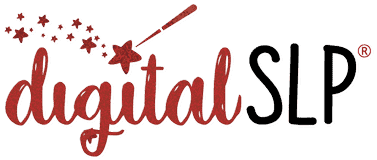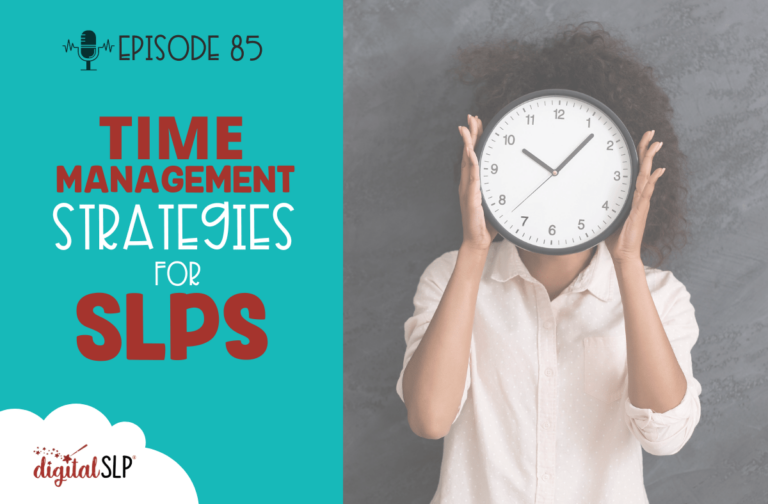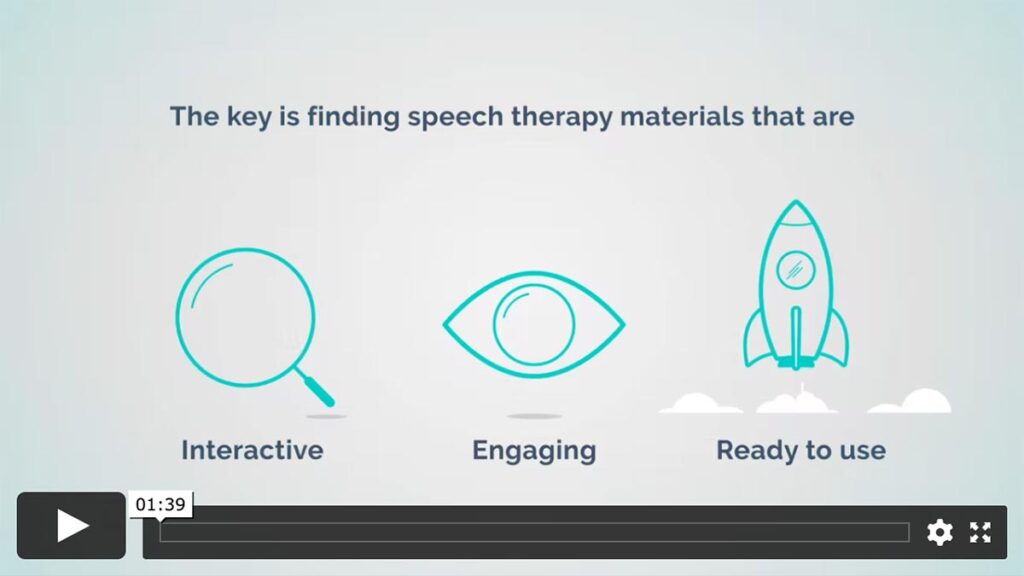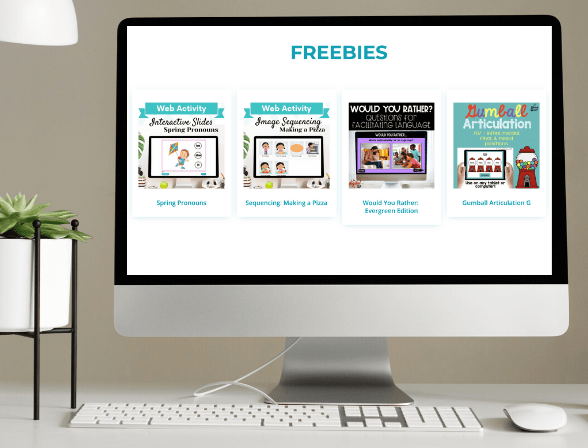Do you get overwhelmed when it comes to managing your time with work? In today’s episode, we will talk all about time management strategies for SLPs and how to best use your time to be as efficient as possible.
Whether you are a brand new CF or have been a working SLP for over 20 years, time management is something we all deal with every second of every day. No matter the setting, whether it be in the schools, hospitals, private practice, etc. it always seems like there is so much work to do, but not enough time to get it all done. Eventually, this may start to feel extremely overwhelming and cause increased frustration or in worst-case scenarios the feeling of being burnt out!
4 Tips for Time Management Strategies for SLPs
1. Blocking Out Time:
Blocking out time each and every day will help you be able to manage all of those tasks that you need to get done. Take this even further and determine which area you need to focus on more, whether this be session planning, paperwork, or communicating with teachers. As you approach your blocked-out time on your schedule, determine which area to dive right into!
Placing a sign on your door to let others know that you are not available during your blocked-out time may help you be able to focus and get more done as well. Don’t forget to switch off or silent the notifications on your phone.
2. To-Do Bin:
Are you that SLP who has a stack of paperwork, mail, and miscellaneous papers all over your desk that you need to attend to? Try incorporating a “to-do-bin.” Place all of the papers into your bin and plan to empty this bin each week. This not only helps you to organize all of your “to-dos” into one space but also helps you visually see your to-do pile get smaller and smaller as you empty it out.
3. The “To-Do List”:
We all have to-do lists, whether it be on paper, in a planner, or even on our phones. Some of you may have to-do lists in multiple places! Take time to organize your way of keeping a “to-do list.” Start by forming just one list and keeping it in the same spot each time. Prioritize that list, ranking items on the list that are then most important or more urgent. Marking those items off the list that you complete is such a great feeling that will help you feel more accomplished.
4. Creating Systems for Frequent Tasks:
There are tasks and assignments that come up consistently whether that be for the same client or for multiple clients. For example, emails that you send out to parents and/or teachers or writing an IEP. Create systems for those frequent tasks and templates to help save time on repetitive tasks.
I hope you find some of these time management strategies for SLPs to be useful. Finding the best systems that work for you personally will help you stay more organized and on top of all of the things that you need to get done. Join me in my next podcast episode 86 in January where I will be talking about how to plan speech therapy sessions in a more timely and efficient way!
Links & Resources
Full Transcript of Podcast: Time Management Strategies for SLPs
Episode 85: Time Management Strategies for SLPs
You're listening to the Speech Space Podcast, a podcast full of tips and resources for SLPs. I'm your host, Jessica Cassity, and this is Episode 85.
Hey there everybody! Today, we are going to be talking about time management and how to best use your time to be as efficient as possible. Before we get started, I did want to mention that this podcast is brought to you by The Digital SLP membership site, which is a site that features time-saving interactive digital resources that are all teletherapy platform-friendly. You can learn more or sign up by going to thedigitalslp.com/digitalslp. All right, let's go ahead and jump on in and talk about some time management strategies for SLPs.
Determining how to best use your time impacts the ability to plan successful therapy sessions and become more organized and efficient with all tasks outside of direct treatment. Whether you are a brand new CF or have been working as an SLP for over 20 years, time management is something that we all deal with every second of every day. No matter the setting, whether it be schools, hospitals, private practice, it always seems like there's so much work to do, but not enough time to get it done. Eventually, this might start to feel extremely overwhelming and cause increased frustration or in worst-case scenarios, the feeling of being burnout, which I know is all too common with SLPs. So what can we do in order to better manage our time? So we're more efficient and effective in the work that we do day-to-day? Today, I'm going to share four tips that you can implement in order to help manage your time to become more efficient in your everyday work.
Tip number one is to block out your time. Many of us try to manage everything throughout our busy schedules, finding small breaks throughout the day to complete those important to-dos. Blocking out time each and every day will help you to be able to manage all of those tasks that you need to get done. So you don't wanna just have this lingering to-do list and no plan for when you're going to get it done. You actually wanna make sure that you set aside a chunk of time to get your to-do list done. So take this even further and determine which area you need to focus on more, whether this be session planning, paperwork, or communicating with teachers. And as you approach your blocked-out time on your schedule, determine which area you're gonna dive right into. So not only are you blocking off your time, but you're kind of segmenting and deciding where you're going to dedicate your time. You know, I think I've talked about this before, whenever we try to multitask, it can actually be detrimental. So putting all of your time or focus into one area and finishing that before moving on to another can be really helpful. Placing a sign on your door to let others know that you're not available during your blocked-out time can also help you to focus and get more done. This will help you to carry out everything you need to get done during your time without others interrupting or risking that 30-minute long conversation with another staff member. So going beyond that as well, you wanna make sure that you put your phone in "Do Not Disturb" mode because the thing is, it's so easy to get an alert on your phone and go down the rabbit hole of checking emails, text messages, social media, and you know, 20, 30 minutes has gone by and you're like, what has even happened in these last 20 or 30 minutes? So you wanna make sure that you not only put a physical sign out on your door, but you also wanna put your phone in "Do Not Disturb" mode as well.
Tip number two that I'm gonna share is to create a to-do bin. So if you are the SLP who has a stack of paperwork, mail, and miscellaneous papers all over your desk, then this one is for you. You want to try to incorporate a to-do bin. So you wanna place all of your papers into this bin and you want to ideally plan to empty this bin each week. So this not only helps you organize all of your to-dos in one space, but it also helps you visually see your to-do pile, get smaller and smaller as you empty it out. And that can be motivating, you know, as we see that we're kind of checking things off, like just like checking off items on a to-do list that can be motivating because we wanna reduce that pile. Now you wanna make sure that you do this on a weekly basis. Like I said, or if that seems like too much or not enough, then you want to go ahead and set a goal as to when this bin needs to be emptied. And that way you don't just leave your bin to get fuller and fuller for weeks on end. So it's really important to kind of set a regular routine maybe on Mondays or Fridays you empty that bin. Or like I said, you set a couple of days, maybe it's on Monday, Wednesday, Friday. You just wanna have some sort of regular rhythm where you're clearing out that bin and it's not just, you know, piling up more and more paperwork where it gets stressful when you look at it. So definitely implement a to a to-do bin if that's not something that you've done. It can actually be really helpful to reduce the clutter that's kind of spread out all over your speech room and then have it all in one nice little bin where it's all compact.
All right, moving on. Number three, the to-do list. I touched on that a little bit in number two. But you know, we all have to-do list, whether it be on paper, in a planner, even on our phones. You know, you might even have multiple to-do lists in multiple places. It happens. I personally do that. Sometimes I have one running on my phone and then I have one on my kitchen counter as well on a piece of paper. But you want to take the time to organize your way of keeping a to-do list. So start by forming just one list and keeping it in the same spot each time. That way you don't fall victim to having different lists in different places and forgetting things on the list or leaving a list behind that you needed. If you have it all on one list in one place, it reduces the risk of happening. So you wanna prioritize that list and you wanna rank the items that are the most important or most urgent. Those can either go at the top or you can put little stars next to them, but most importantly, you wanna mark off the items on the list as you complete them, because it's such a rewarding feeling and it actually can motivate you to get more accomplished. You know, whenever we're looking at a list and it's long and we haven't done anything on it, it can feel really overwhelming and cumbersome. And once we get started on that list, we start to feel more motivated and accomplished. So you wanna make sure that you're checking off those items on your list. And if you're like me and you do an extra thing, that's not on your list, you can add it to your list and check it off. That is not really a real tip, but that is a true confession of something that I do. And I would imagine that there are probably some of you listening who do the same thing as well.
All right. So let's move on to number four, creating systems for frequent tasks. So there are tasks and assignments that come up consistently, whether that be for the same client or for multiple clients. For example, say emails that you send out to parents or teachers or writing IEPs. Another example might be sending home a slip explaining homework each week. So one great strategy that can help cut down on time spent on those things and make you feel more efficient is to create systems for those frequent tasks. So let's take sending emails to parents and teachers is our first example. This is something that you likely do for most of the students on your caseload. Now, instead of recreating a new email, each time you can create a system where you have an email template and you just have to fill in the essential information for that specific student when forming the email. So creating weekly or daily or monthly, or however often you send out these emails, a template for your students that can be a really helpful thing. And then you can just tweak it based on goals and, you know, the personalized recommendations that you wanna send out in that email, but having a template is a great place to start. Another example is IEP writing. There will be multiple IEPs to write throughout the school year, as I'm sure that you are all very aware, but instead of starting from scratch each time, create a system, create a template. You might create a checklist that you can use for each IEP that you write as well, reminding you of each step that you need to take in the process of writing the IEP and then having the template for the IEP, which I'm hoping that most of you do because writing an IEP from scratch is giving me nightmares, just thinking of it right now. Once you've written, you know, different IEPs for different tests that you administer or different, you know, areas that you're assessing, you can kind of have different templates for those different areas and then repurpose them and modify them to make it applicable to the student that you're currently assessing or evaluating. So finding the best systems that work for you personally will help you stay more organized and on top of all the things that you need to get done. Once you can become a little bit more organized in your methods and systematic about how you run your day-to-day, once you put some forward thought into that, and kind of do some loading organization, then you are ready to dive into your session planning.
So join me for our next episode on how to plan your sessions in a more timely and efficient way. That will be Episode number 86. We will not be having the podcast the second Tuesday of December, because we are gonna be breaking for the holidays. However, we will be back in January. And like I said, we will be talking about session planning and how to be more efficient in your session planning. And that will be Episode 86 in January. So I hope that you all have a wonderful, wonderful holiday season. As always, if you have any requests for podcasts, you can reach out to me at jessica@thedigitalslp.com. And if you would like to access the show notes from today, you can head on over to bit.ly/TSSEP85. Thanks so much for tuning in and we'll talk again soon.













Recent Comments